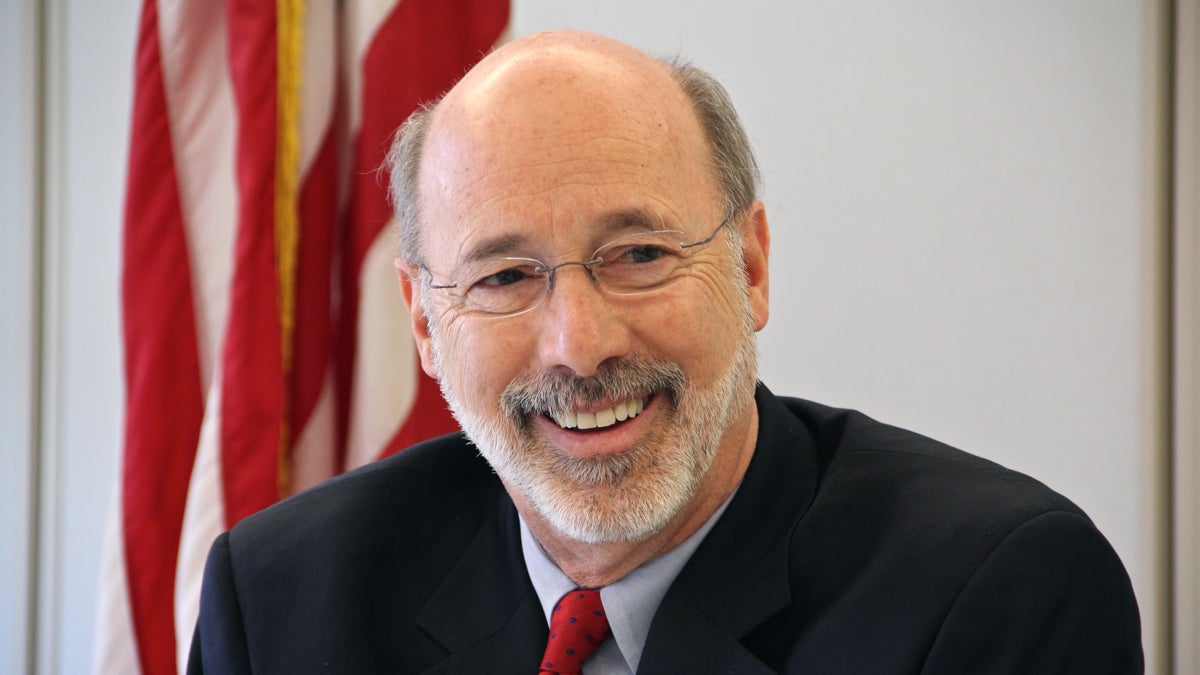Gov. Wolf’s blueprint for school spending nets Philadelphia 7.55 percent boost

Governor Tom Wolf has released details of his "restoration" funding formula to the protest of leading Republican state lawmakers. (Emma Lee/WHYY)
The School District of Philadelphia stands to see a $76.8 million boost this school year, based on Gov. Tom Wolf proceeding unilaterally on dividing state education cash.
On Tuesday, Wolf released details of his “restoration” funding formula to the protest of leading Republican state lawmakers.
Although Wolf allowed the state budget as passed by the Republican-controlled legislature to become law without his signature in late March, he vetoed the fiscal code bill that, in part, serves as a roadmap for how new education funding would be apportioned.
As passed by lawmakers, the fiscal code directed all new education money through a student-weighted funding formula as recommended by a bipartisan commission.
Wolf and other Democratic leaders argue that districts should first be made whole after the cuts that occurred when the legislature agreed to Gov. Tom Corbett’s 2011 austerity plan that coincided with the expiration of federal stimulus dollars.
Corbett’s plan — which disproportionately hurt Philadelphia schools — was his way of avoiding a tax increase to cover the double-whammy of a state budget deficit and the gap left when Washington, D.C., ended stimulus funding.
Wolf first utilized his restoration formula in January after approving a half-year school spending plan. Tuesday’s announcement continued that move.
“The new fair funding formula, which I support, cannot truly be fair unless the cuts are fully restored,” said Wolf in a statement. “Currently, only 4 percent of districts have seen their funding restored to 2010-11 levels, and we are currently over $370 million short from fully restoring the cuts.”
With the unilateral action, Wolf has further staked his political future on a plan to dramatically increase the state’s responsibility for education spending.
Pennsylvania has garnered national attention for having the widest spending gaps between its richest and poorest districts. That phenomenon, in large part, is because the bulk of school funding in the state comes from the local property tax-base.
House Majority Leader Dave Reed, R-Indiana, blasted the governor’s logic.
“Once again, the governor has proven to have a total disregard for the bipartisan Basic Education Funding Commission formula that would have finally brought fairness and equity to our public schools,” said Reed in a statement. “Sadly, it’s yet another campaign promise that has fallen to the wayside.”
Republican leaders in both the House and Senate questioned the legality of Wolf’s decision, and they would not rule out the possibility of a lawsuit to prevent the governor from releasing the funds.
House Republican spokesman Steven Miskin took to social media to question whether Wolf was a “despot” who only represents “his personal fiefdoms.”
The Republican-backed fiscal code plan would have undone Wolf’s earlier restoration disbursement, in which he divided $100 million in the basic education funding and $50 million in block grant money to make up for past cuts.
Those included Corbett’s elimination of the funds used to reimburse districts for the added systemic costs of charter schools — a fiscal setback that especially hurt Philadelphia and contributed to massive layoffs and years of widespread resource deficiencies.
Tuesday’s action looks to divide another $50 million in new basic education funding in very similar ways.
The $76.8 million boost that Philadelphia stands to gain in total for the 2015-16 school year represents a 7.55 percent increase over last year.
Of the state’s 500 school districts, five would see higher percentage increases: Chester-Upland, Wilkinsburg, Norristown, Woodland Hills, and Phoenixville. The majority of districts would see a less than 2 percent boost.
Of the total $200 million in new money, Wolf’s restoration formula directs 38 percent to Philadelphia’s district and charter schools, which educate 12 percent of the state’s student population.
Of the $5 million that Wolf plans to direct through the new student-weighted funding formula — which accounts for measures such as concentration of poverty, number of English language learners, and district geographic sparsity — Philadelphia looks to get 23 percent of the total sum.
Still, the Wolf administration says Philadelphia will still only be 87 percent restored through their plan.
WHYY is your source for fact-based, in-depth journalism and information. As a nonprofit organization, we rely on financial support from readers like you. Please give today.




